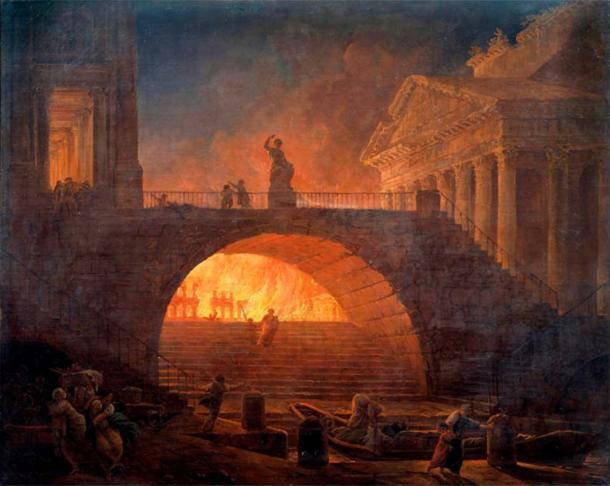
Did Nero Really Fiddle While Rome Burned?
Nero, the infamous emperor of the Roman Empire, is known for his cruelty and debauchery. However, one of the most enduring tales about him is that he played the fiddle while Rome burned during theGreat Fire of the first century. But is this account really true, or just another example of propaganda and manipulation of history?
The Great Fire
On the night of July 18, 64 AD, a fire erupted in the merchant district of Rome, fueled by strong summer winds that rapidly spread flames throughout the city's aged wooden structures. Tacitus, the historian, reported that the fire burned uncontrollably for five days before it was finally subdued. Out of the fourteen districts in Rome, four were left untouched, three were completely destroyed, and seven suffered significant damage.
Tacitus was the only Roman writer alive during that period, apart from Pliny the Elder, who wrote about the fire. There is, however, an epistle, supposedly from Seneca the Younger to St. Paul, which states explicitly the damage done by the fire – according to him, only four blocks of insulae (a type of apartment building) and 132 private houses were damaged or destroyed. Still, one could question the motive of Seneca the Younger, as these figures were given in the context of the execution of Christians who were blamed for starting the fire. By showing that only a small amount of damage was inflicted by the fire, it would have highlighted the unjust punishment meted out against the Christians.

Fire in Rome by Hubert Robert (1785). Public domain.
The Cruel Emperor Who Fiddled in a Disaster
In the aftermath of the fire, rumors quickly spread about the cause of the fire. As one popular account goes, Nero had been planning the construction of his grand palace, the Domus Aurea, but needed to clear a large area to accommodate the palatial complex. So, he arranged for a fire to break out in order to clear the aristocratic dwellings on the slopes of the Palatine Hill and gleefully fiddled as he watched the fire encompassing Rome. He then, of course, needed a scapegoat for his actions, so he blamed the Christians for the fire because of their apocalyptic belief that Rome and the world would end by fire. This led to an active campaign against them. Both, the fire and the persecution of the Christians became the defining image of his reign. But how much of this account is actually true?
- New Claims the Great Fire of Rome Was Exaggerated And Nero Was A Hero
- Roman Emperor Nero: Does He Deserve His Bad Boy Reputation?

Emperor Nero fiddling while Rome burns. Source:Sunshower Shots / Adobe Stock.
Nero’s Alibi
According to Tacitus, Nero was at Antium (about 60 km south of Rome) when the fire broke out in Rome. Thus, Nero would not have been about to watch on while it burned. Even so, Tacitus acknowledges that Nero appeared on a private stage and sang the ‘Sack of Ilium’ as a comparison between Rome’s present misfortune and the disaster that befell ancient Troy. Tacitus, however, dismisses the story as merely a rumor that was spread amongst the masses. This rumor was perhaps credible as Nero was known after all to be highly interested in the performing arts.
It is worth noting that Tacitus does not mention any musical instruments being played during the Great Fire. Even if Nero had been performing while Rome burned, it is unlikely that he would have been aware of the fire, and it is even more unlikely that he would have been playing a fiddle. This is because the fiddle was not invented until much later, possibly in the 11th century. If Nero had been playing a musical instrument, it would have more likely been the cithara, an ancient Greek instrument in the family of the lyre.
A Kind and Generous Nero?
Nero’s supposed lack of concern for Rome while it burned has stuck in our minds since the rumor first began. But Tacitus gives a very different account of Nero’s actions upon learning of the Great Fire. According to Tacitus, Nero opened up the Campus Martius and the public gardens for the people who lost their homes. In addition, he raised temporary structures, and even opened up his own gardens to shelter his subjects. In order to feed them, he brought food supplies from Ostia and the neighboring towns, and the price of corn was reduced. Nevertheless, it is the image of Nero as the ruthless and conniving emperor that has remained in place over the centuries.
Tarnishing Nero’s Image
This deliberate attempt to mar the image of Nero may be due to the fact that the people who wrote Rome’s history were not very pleased with Nero. Although Suetonius and Cassius Dio claimed that the people of Rome celebrated Nero’s death, Tacitus paints a more complex picture. According to this writer, it was the upper class, the nobility, and the senators, who rejoiced at Nero’s death. By contrast, thelower class and slaves mourned Nero’s death because they felt he had their best interests at heart. Furthermore, two future emperors, Otho and Vitellius, would use the memory of Nero to gain the support of the Roman people. Thus, it may be said that the negative image that we have of Nero may not be entirely due to the evilness of the emperor himself, but due partially to the historians who wrote unfavorably about him.
This also leads us to question how much of what we know about Nero really is true. For example, according to popular accounts, Nero took great pleasure in throwing Christians to packs of dogs, and host parties while he and his guests watched Christians burning on stakes in his garden. The Sibylline Oracles, Book 5 and 8, written in the 2nd century, claimed Nero was the antichrist, and it has even been suggested that the number 666 in the Book of Revelation is a code for Nero.
The brutality of Rome and its emperors is well known and well recorded, as was the persecution of Christians, but are such horror stories ascribed to Nero based on fact, or has history been manipulated by those who sought to use it to gain and maintain power? Historians today continue to search for answers to these questions, and as excavations on his palace continue, more and more information is emerging about Nero and the world he reigned over. As for Rome, a city made of marble and stone grew from the ashes of the Great Fire.
Top image: Emperor Nero playing music while Rome burns. Source:Justinas / Adobe Stock.
By Ḏḥwty
References
Ask History, 2012. Did Nero really fiddle while Rome burned?. [Online] Available at: http://www.history.com/news/ask-history/did-nero-really-fiddle-while-rome-burned
Clark, J., 2014. Did Nero really play the fiddle while Rome burned?. [Online] Available at: http://history.howstuffworks.com/history-vs-myth/nero.htm
Gill, N. S., 2014. Nero Burning Rome. [Online] Available at: http://ancienthistory.about.com/od/nero/qt/012911-Nero-Burning-Rome.htm
Gyles, M. F., 1947. Nero Fiddled While Rome Burned. [Online] Available at: http://penelope.uchicago.edu/Thayer/E/Journals/CJ/42/4/Nero_Fiddled*.html
Upton, E., 2012. Nero Didn't Fiddle While Rome Burned. [Online] Available at: http://www.todayifoundout.com/index.php/2013/07/nero-didnt-fiddle-while-rome-burned/
Wikipedia, 2014. Nero. [Online] Available at: http://en.wikipedia.org/wiki/Nero
















Comments
If Rome was in truth just a bunch of Atlantean-era ruins (as was also Pompeii and all around the Med), and NOT actually the thriving metropolis/political power seat as we are led to believe, then having it all burn down in a big fire in a fake historical account would be needed to explain what happened to it. In other words, if something does not exist, but it is/was needed to support some other false narrative (maybe having to do with a coverup of brutal Persian/Semitic invasions into the fair-haired European villages), there would be reason to both create AND destroy it in a false history. But that is difficult, as such and so much else (deception) about ancient history DOES NOT ADD UP when you look closely and get down into the details.
Nobody gets paid to tell the truth.
An ad popped up and scared me. 4/5 stars!
As usual, so called "historians" take old accounts using their biased lens. We are not talking about filthy politics such as Obama, Clinton, Trump, McCain, but St. Paul. You must be of the devil to insinuate such evil.
Like many things in ancient history, the Fiddle while Rome Burns phrase has probably lost its original meaning. Fiddle comes from the Latin Vitula which mean to dance around lively or to rejoice. (its cognate with Vitality etc). So if Nero was in fact participating in a play (merriment) he would have indeed been fiddling while Rome burned. Even if he did not realize it at the time. By the time of Shakespeare this original meaning would have been lost as Etymology did not become a study until the brothers Grimm began their collection of stories, thus they would have assumed it was with a Fiddle.
Corn was a generic name for a host of different grain crops including wheat, barley, oats, rye. Italy produced insufficient food to fee itself, in large part because Rome had grown to a huge metropolis of more than 1 million people. Various other cities in Italy had experienced similar growth, so Rome was heavily dependent upon corn or grain imports from north Africa, Sicily, and later Egypt. As you rightly noted, maize was introduced to Europe by Spain starting in the 16th century. The advantage of maize was that much more food protein could be produced over much less farmland at a cost of heavily depleting the soil.
Pages